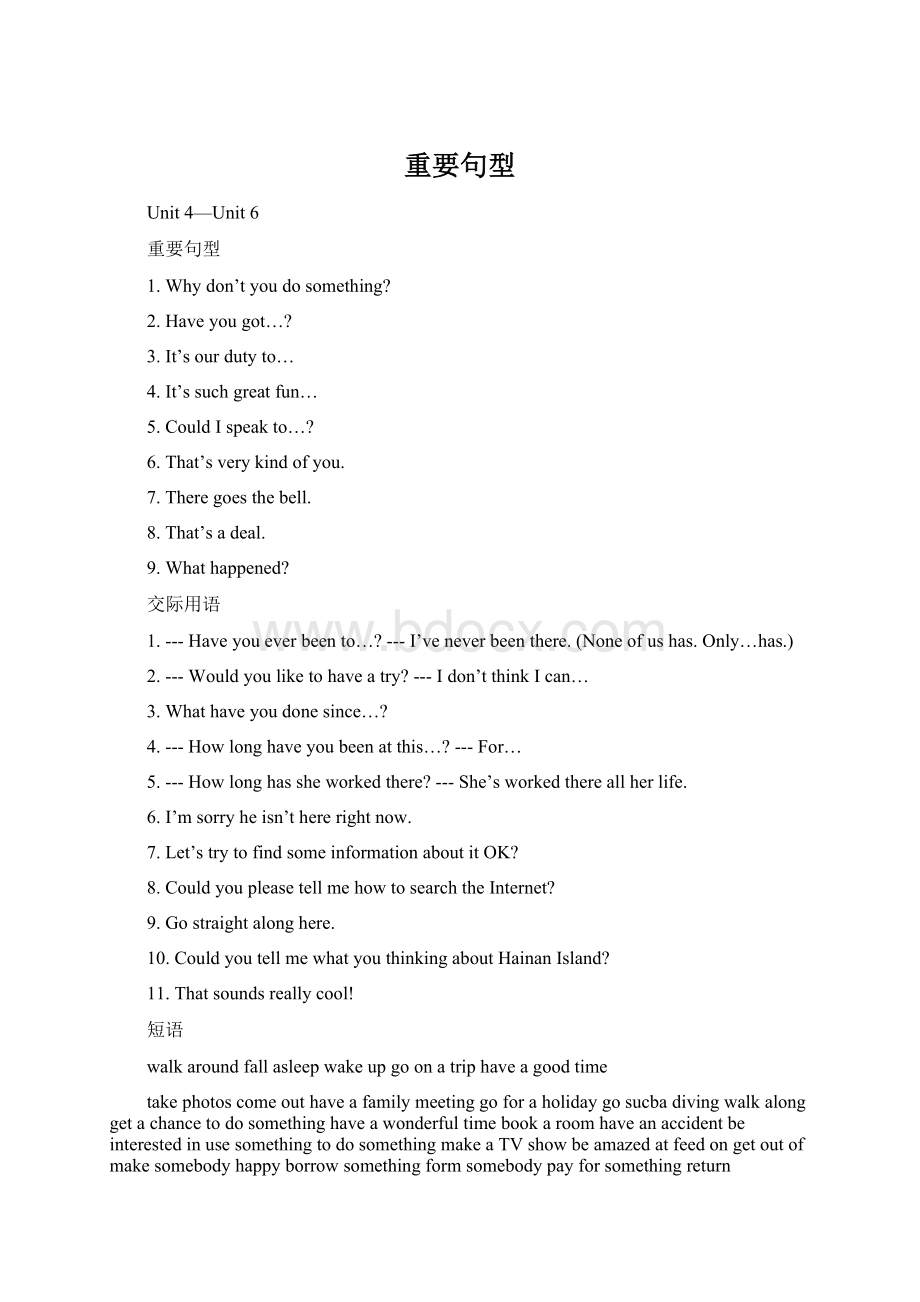重要句型文档格式.docx
《重要句型文档格式.docx》由会员分享,可在线阅读,更多相关《重要句型文档格式.docx(8页珍藏版)》请在冰豆网上搜索。

1.---Haveyoueverbeento…?
---I’veneverbeenthere.(Noneofushas.Only…has.)
2.---Wouldyouliketohaveatry?
---Idon’tthinkIcan…
3.Whathaveyoudonesince…?
4.---Howlonghaveyoubeenatthis…?
---For…
5.---Howlonghassheworkedthere?
---She’sworkedthereallherlife.
6.I’msorryheisn’thererightnow.
7.Let’strytofindsomeinformationaboutitOK?
8.CouldyoupleasetellmehowtosearchtheInternet?
9.Gostraightalonghere.
10.CouldyoutellmewhatyouthinkingaboutHainanIsland?
11.Thatsoundsreallycool!
短语
walkaroundfallasleepwakeupgoonatriphaveagoodtime
takephotoscomeouthaveafamilymeetinggoforaholidaygosucbadivingwalkalonggetachancetodosomethinghaveawonderfultimebookaroomhaveanaccidentbeinterestedinusesomethingtodosomethingmakeaTVshowbeamazedatfeedongetoutofmakesomebodyhappyborrowsomethingformsomebodypayforsomethingreturnsomethingtosomebodylearnsomethingfromsomebodybefamousforsomethingkeepdoingsomethingallowsomebodytodosomethingencouragesomebodytodosomething
词组区别
1.such/so
2.either/too/also
3.if/whether
4.cost/spend/pay/take
5.bad/badly
6.interesting/interested
7.dead/die/death/dying
聚焦考点
1.except/besides
“except”意思是“除……之外”,是指不包括后面所提人或物在内的“除了”,表示两部分的不同。
Hecanchooseanyonehelikesexceptthisone.
Everyoneisexcitedexcepthim.
“besides”是包括后面所人或物在内的“除了”,表示两部分的相似性。
Thirtystudentswenttoseethemoviebesideshim.他和另外30人都去看了。
Besidesphysics,theylikehistory.历史和物理都喜欢。
2.keepdoing/keepondoing
“keepdoing”指连续地、反复不断地做某事,中间不间断。
Itkeptrainingforthewholeafternoon.
“keepondoing”指反复坚持做某事,但动作之间略有间隔。
He’skeptonhelpingtheoldmanformorethanfiveyears.
3.gotosleep=fallasleep入睡
Shewenttosleepattwoo’clock.
gotobed上床睡觉(强调的是上床这一动作);
gotosleep入睡、睡着(强调入睡的概念);
gettosleep设法入睡(强调开始入睡,常用于否定含义的句子里)。
Iwenttobedateleveno’clocklastnight,butIfounditveryhardtogettosleep.
4.such/so
“such”意思是“如此的”,常用做形容词,来修饰名词。
结构为:
sucha/an+形容词+名词(单),such+形容词+名词(复数/不可数)。
Sheissuchaclevergirl.
“so”意思是“如此”,是副词,用来修饰形容词或副词。
so+形容词/副词,so+形容词+a/an+名词(单)。
Whydidyougetupsolate?
Thepartyissointeresting.
当名词前有many,much,few,little等表示多少时,应该用so,结构为:
so+many(few)+名词(复数),so+much/little+名词(不可数)。
sogoodafilm=suchagoodfilm
somanyboys=suchalotofboys
somuchdeliciousfood=suchdeliciousfood
Hehassomanynicebooks.
Onlysolittletimeisleft.
5.由that引导的宾语从句,that没有实际意义,常常被省略。
注意的问题:
1)that引导的宾语从句常做动词think,guess,say,know,hear,forget,see,hope,wish等的宾语。
2)用think,suppose,believe等表示看法的动词引导的宾语从句是否定时,其否定要前置。
Idon’tthinkheisright.
3)宾语从句的时态要和主句的时态保持一致,但当宾语从句所表示的是客观真理时,该从句仍用一般现在时态。
Hesaidhismotherwashavingameeting.
(1).---Whatdidtheteachersayjustnow?
---Hesaidtheearth___roundthesun.
AgoBgoesCgoingDwillgo
6.Thatsoundsreallycool!
那听起来可真棒!
该句中的“sound”是一个系动词,意思是“听起来”,后常接形容词做表语。
类似的系动词还有:
look,seem,smell,taste,get,turn,become,grow等。
Wewereallhungryandthefoodtastedgood.
Helookstired.
Yourbrotherseemedangry.
7.either/too/also“也”
either用做“也”讲时是副词,常用于否定句句尾。
Sheisnotagooddoctor.I’mnoteither.
too常用于肯定句或疑问句句尾表示“也”。
Ilikegeography,too.
also常用于肯定句或疑问句,一般位于句中,表示“也”。
Shealsowenttherebybike.
8.if/whether是否
引导宾语从句,一般情况下,if与whether可以互换,但在下列情况下只能用whether而不能用if:
1)与ornot连用时:
Pleasetellmewhetheryouhavefinishedyourworkornot.
2)后接动词不定式时:
Theyhaven’tdecidedwhethertoplaybasketballwithme.
3)所引导的宾语从句放在主句之前时:
Whetheryouwillwinorlose,wedon’tmind.
4)引导主语从句或表语从句时:
Whetherheisgoingtothemeetingisasecret.
Themostimportantthingwaswhetherhehadgone.
if还能引导条件状语从句,表示“如果、假如”,而whether没有此用法。
Ifyouareindanger,pleasecall110.
(2).We’renotsureifit____tomorrow.Ifit____,wewon’tclimbtheSouthHill.
Awillsnow,snowsBwillsnow,willsnow
Csnows,snowsDsnows,willsnow
9.pay/spend/take/cost
1).pay,做动词用时,一般以某人为主语,一般指花钱、付款等,很少用来指花费时间,常用结构为:
pay+for。
Youwillhavetopayforthebook.
2).spend,一般用某人做主语,表示“(某人)花费……、付出……”,也可指花费时间或金钱,指时间常与in搭配,指金钱常与on搭配。
spend+onsomething.或者spend+(in)doingsomething.
Ispendtwohoursindoingmyhomeworkeveryday.
3).take,也指“花费(时间、金钱)”,但通常用某事、某物做主语,或用it做形式主语,结构为:
“Ittakessomebodysometimetodosomething.”
Ittookmethreehourstofindtheplacelastnight.
4).cost,一般用某物做主语,表示“(某物)值……、花费……”,即指花费时间也可以指花费金钱,无被动语态。
something+cost.
Thenewdictionarycostme120yuan.
(3).Digitalcamerasarebecomingmoreandmorepopular,bu